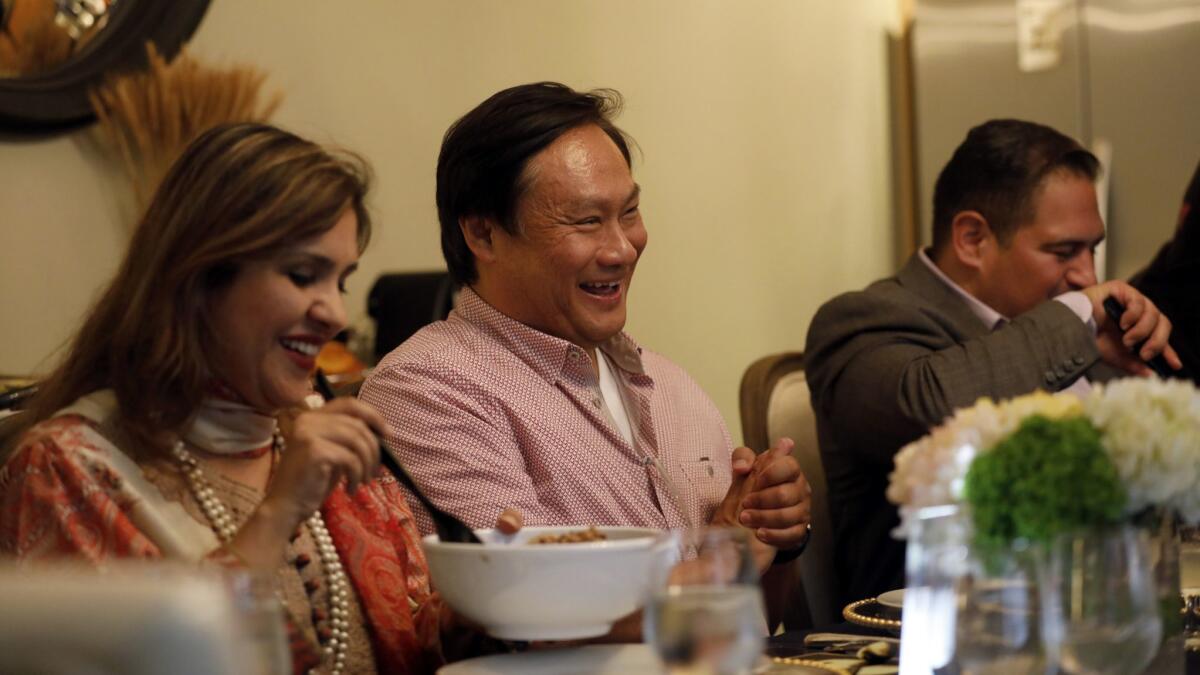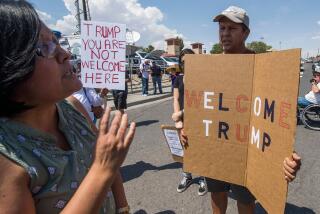Op-Ed: Planting seeds of bipartisanship one community meeting at a time

If America were on the psychiatrist’s couch, the doctor would diagnose depression. But she might have a harder time pinpointing the cause. Languishing middle-class wages? Rising inequality? A disorienting pace of economic and social change?
Yet so much greater are our causes for gratitude! Denizens of other eras and countries would give anything to enjoy just a few of America’s manifold blessings. Ours is the richest and strongest nation in history. It is at peace, and faces competitors but no major threat. It is more just and democratic than it has ever been. As a gay American — now happily, and miraculously, married to the man I love — I can bear personal witness to my country’s commitment to self-improvement.
So why the distemper? Partly because of political polarization. Although Americans have always been diverse and disputatious, thanks to the genius of James Madison, our system has been pretty good at forcing ideologues to negotiate and compromise. But what we are seeing now is something different and more disturbing, and probably harder to deal with.
Americans’ genius for civic organization has been, historically, our greatest asset.
Political scientists call it affective polarization. Red and blue America not only disagree with each other about issues, they dislike and distrust one another as people. Large and growing shares of partisans see the other party as a threat to the country. They do not want to live near one another. They do not want their kids to intermarry.
Polarization magnifies every conflict. Also, though, it is a symptom of a deeper problem: the deterioration of the civic ties and organizations that the country has relied on to bring diverse people face-to-face to solve problems and find common ground. Examples include unions, churches, civic and volunteer clubs, youth groups, hands-on charities, and more.
As our country’s greatest observer, Alexis de Tocqueville, noted many years ago, Americans’ genius for civic organization has been, historically, our greatest asset. Civic associations mediate between the lonely crowd of individuals and the faceless efficiency (or inefficiency) of bureaucracies and corporations. In doing so, they give people voice and agency, build social buffers against tyranny and anarchy, and create bonds of friendship and mutual support.
This vital form of social capital is at a low ebb thanks to hypercompetitive economic globalization, outrage-mongering social media, and opportunistic political demagoguery. As a result, more people feel voiceless and helpless, which angers and radicalizes them, driving them even further apart.
It is a challenging situation, to say the least. But I am hopeful that we can pull out of this spiral. I have seen, firsthand, that the forces of connection and renewal described by Tocqueville are alive and fighting back.
I am on the board of an organization called Better Angels, a national grassroots movement to depolarize the country, one community at a time. Committed conservatives and progressives — Donald Trump Republicans and Hillary Clinton Democrats — meet in structured workshops, not to change one another’s minds but to relearn how to communicate and connect as fellow citizens. After only a few hours, participants emerge able to see the humanity and positive intentions on the other side. Those angry partisans often become neighbors and friends.
One community at a time? Sure, nice, but it will never scale — or so I once feared. But I have watched with astonishment as the idea has spread across the country. So far, groups and workshops — all volunteer — have sprouted in 30 states plus the District of Columbia. Almost 300 people have trained to become moderators who can in turn train others. Each new workshop not only plants seeds of local bipartisanship, but also broadcasts the empowering message that ordinary people can take action against our would-be dividers.
Enter the Fray: First takes on the news of the minute from L.A. Times Opinion »
Better Angels is just one example. Other groups are pursuing similar missions, with names like Bridge the Divide and Living Room Conversations. Even in today’s hyperpartisan Congress, the bipartisan Problem Solvers caucus has persuaded the incoming Democratic House leadership to clear the path for legislation that commands bipartisan support.
Right now, the forces of reconnection seem small and fragmented, whereas the forces of polarization are led by no less a figure than the president of the United States. So why am I hopeful? Because Americans, both grassroots and elites, have awakened to the challenge.
Accepting the 1988 Republican nomination for president, former President George H.W. Bush famously likened America’s panoply of civic groups to “a brilliant diversity spread like stars, like a thousand points of light.” America is bound to be a neurotic, unhappy place if those lights dim. The way to rekindle them is one at a time, a thousand times over.
Jonathan Rauch is a senior fellow at the Brookings Institution in Washington, D.C. His latest book is “The Happiness Curve: Why Life Gets Better After 50.”
This article is one in a series offering reasons for optimism in 2019.
Follow the Opinion section on Twitter @latimesopinionand Facebook
More to Read
A cure for the common opinion
Get thought-provoking perspectives with our weekly newsletter.
You may occasionally receive promotional content from the Los Angeles Times.










